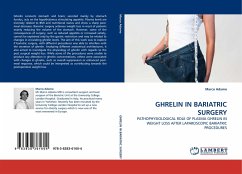Ghrelin connects stomach and brain; secreted mainly by stomach fundus, acts on the hypothalamus stimulating appetite. Plasma levels are inversely related to BMI and nutritional status and show a sharp post-meal decrease. Bariatric surgery achieves weight loss in most of patients mainly reducing the volume of the stomach. However, some of the consequences of surgery, such as reduced appetite or increased satiety, cannot be explained only by the gastric restriction and may be related to changes in circulating ghrelin levels. The aim of this work was to explore if bariatric surgery, with different procedures was able to interfere with the secretion of ghrelin. Analyzing different anatomical architectures, it also aimed to investigate the physiology of ghrelin with regards to the post surgical weight loss. While some of the procedures were unable to produce any alteration in ghrelin concentrations, others were associated with changes in ghrelin, such as overall suppression or enhanced post-meal response, which could be interpreted as contributing towards the postoperative weight loss.
Bitte wählen Sie Ihr Anliegen aus.
Rechnungen
Retourenschein anfordern
Bestellstatus
Storno








